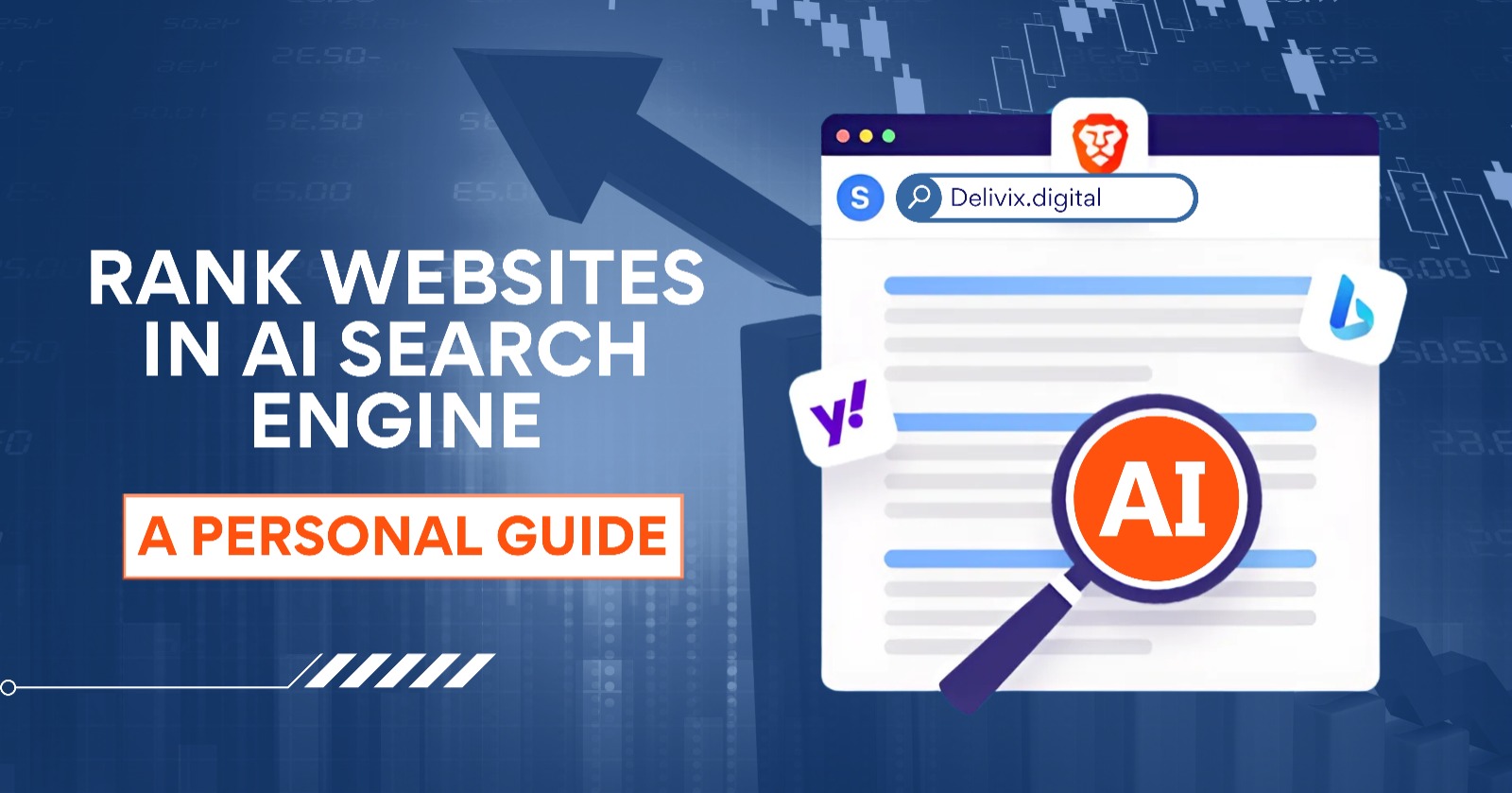When I first started building websites, I was obsessed with cracking Google’s algorithm, also called GEO these days, stuffing keywords, chasing backlinks, and tweaking meta tags like my life depended on it.
But as AI search engines like Perplexity, SearchGPT, and even Google’s Gemini started stealing the spotlight in 2025, I realised the game had changed. My old SEO playbook wasn’t cutting it anymore.
After months of trial, error, and diving deep into what makes AI search tick, I’ve learned that ranking in these engines is less about gaming metrics and more about creating content that resonates with users and earns trust across the web.
In this guide, I’m sharing my personal insights, backed by recent studies and practical strategies, to help you get your website ranking in AI search engines.
You may also be interested in a couple of other guides I wrote about the differences between SEO and GEO, and the concept of EETA in GEO.
Why AI search engines are different
AI search engines don’t just match keywords, they understand intent, context, and what people are saying about you online. I was skeptical at first, thinking Google’s dominance would never waver.
But after seeing platforms like Perplexity deliver concise, conversational answers that users loved, I knew I had to adapt. A 2025 study analyzing 40,000+ queries across AI search engines showed they prioritise three things:
- Intent-Driven Relevance: Content that directly answers a user’s question.
- Collective Sentiment: What the web, X posts, and communities say about your brand or topic.
- Contextual Depth: Content that fits into the broader narrative of a query, not just exact phrases.
This shift forced me to rethink my approach, moving away from keyword obsession to creating content that feels human and trustworthy.
| Step | Description |
|---|---|
| 1. Answer User Questions Directly | Find specific, conversational questions users ask in your niche using tools like AnswerThePublic or X posts. For example, target queries like “What’s the best 10-minute workout for beginners?” instead of broad terms like “fitness.” Write clear, concise answers to match user needs. |
| 2. Add Structured Data | Use Schema.org markup, like FAQ or HowTo schemas, to make your content’s purpose clear to AI crawlers. For instance, add JSON-LD code to a recipe page to highlight ingredients and steps, increasing chances of appearing in AI answer boxes. |
| 3. Build a Strong Online Reputation | Engage with communities on X and earn mentions from trusted sites through guest posts or influencer collaborations. Positive reviews and forum mentions signal trustworthiness, helping AI engines rank your content higher. |
| 4. Write for Conversational and Voice Search | Focus on long-tail, natural questions like “How do I start a blog in 2025?” Write in a conversational tone and use lists or tables to aim for featured snippets, which AI engines often pull for voice responses. |
| 5. Keep Your Site Technically Sound | Ensure fast loading (under 2 seconds) with Google PageSpeed Insights, make your site mobile-friendly, and maintain a clear sitemap. This helps AI crawlers navigate and boosts user experience, which AI engines prioritize. |
| 6. Update Content Regularly | Refresh your pages every 3-6 months with new info, stats, or trends. Monitor X for real-time user questions to keep content relevant, ensuring AI engines see your site as current and valuable. |
My Strategies for Ranking in AI Search Engines
1. Focus on user intent
I learned early on that AI search engines are scarily good at understanding what users want. When I optimised my fitness blog, I stopped targeting broad keywords like “weight loss” and started answering specific questions like “What’s the best 10-minute workout for beginners?” Here’s how I do it:
- Dig into Queries: I use tools like AnswerThePublic and monitor X posts to find trending questions in my niche. For example, I noticed a spike in queries about “AI search optimization” on X, which inspired this article.
- Answer Upfront: I structure my content with clear headings and bullet points, putting the most important answers in the first 100 words. AI engines often pull these snippets for quick responses.
- Show Expertise: I back my claims with data or personal experience. For instance, I referenced a 2024 Moz study showing AI engines favor content with clear authorship, especially for sensitive topics like health or finance.
2. Use structured data for clarity
One of my biggest wins came from implementing schema markup. When I added FAQ and HowTo schemas to my blog posts, I noticed AI engines like Perplexity started featuring my content in their answer boxes. Here’s what worked for me:
- Use Schema.org Markup: I add structured data to clarify my content’s purpose. For example, on a recipe page, I use Recipe schema to highlight ingredients and steps.
- Keep It Simple: I use tools like Schema Markup Generator to create JSON-LD code, which I paste into my site’s HTML. This helps AI crawlers understand my content’s context.
- Test Regularly: I check my schema with Google’s Rich Results Test to ensure it’s error-free.
FAQ Schema Example for AI Search Optimization
This is an example of a JSON-LD FAQ schema I used to help AI search engines understand my content better and improve rankings.
Schema Type: FAQPage
Question: How do I rank in AI search engines?
Answer: Focus on user intent, use structured data, and build a strong online reputation.
Implementing this schema can enhance your visibility in AI-driven search results.
Learn More About Schema Optimization3. Build a strong online reputation
AI search engines don’t just look at your site—they scan what others say about you. I learned this the hard way when my e-commerce site struggled to rank until I started engaging with communities. Here’s my approach:
- Engage on X: I actively respond to X posts about my niche, sharing insights and linking to my content. This boosts my brand’s visibility and credibility.
- Earn Mentions: I’ve reached out to industry blogs for guest posts and collaborated with influencers. A mention from a trusted site in my niche doubled my traffic from AI searches.
- Monitor Sentiment: I use tools like Brand24 to track what people say about my brand online. Positive reviews and mentions on forums help AI engines trust my content.
| E-E-A-T Factors | Impact on GEO |
|---|---|
| Experience | It shows the lived experiences and uniqueness of the content to AI models. |
| Expertise | It signals the depth of the subject matter and increases the likelihood of being cited in AI responses. |
| Authority | It ensures that your website is selected as a reliable and authentic source by LLMs. |
| Trust | It ensures credibility by reducing the chances of getting removed or filtered out over safety and compliance concerns. |
4. Optimise for conversational and voice search
When I started optimizing for voice search (like Grok’s voice mode on its iOS app), my traffic from conversational queries spiked. AI engines love content that mirrors how people talk. My tips:
- Target Long-Tail Queries: I optimise for phrases like “What’s the easiest way to start a blog in 2025?” instead of short keywords.
- Use Natural Language: I write as if I’m answering a friend’s question, which aligns with how users ask AI assistants.
- Aim for Featured Snippets: I structure content with lists, tables, or definitions to land in “position zero.” For example, a table comparing workout plans on my fitness site got picked up by SearchGPT.
5. Prioritise technical excellence
I used to overlook technical SEO, but AI engines are picky about user experience. After I optimised my site’s speed and mobile performance, my rankings improved. Here’s what I focus on:
- Speed Matters: I use Google PageSpeed Insights to keep my site loading under 2 seconds. Compressing images and using a CDN made a huge difference.
- Mobile-First: Since most AI searches happen on mobile, I ensure my site is fully responsive with tools like Google’s Mobile-Friendly Test.
- Clean Structure: I maintain a clear sitemap and fix broken links to make my site easy for AI crawlers to navigate.
6. Stay fresh and relevant
AI engines love fresh content. I update my blog posts every few months with new data or insights. For example, I revised an old post on SEO trends with 2025 statistics, and it started ranking in Perplexity’s results. I also monitor X for real-time trends to keep my content aligned with what users are asking.
Tools I rely on
- AnswerThePublic: For finding user questions.
- Google Search Console: To track which queries drive AI traffic.
- Schema Markup Generator: For easy structured data.
- Brand24: To monitor online mentions.
- X Platform: For spotting trending topics and engaging with users.
Challenges faced
It wasn’t all smooth sailing. Early on, I over-optimised with keywords, which hurt my rankings in AI engines that detected unnatural patterns. I also struggled to get mentions from authoritative sites until I started building genuine relationships with bloggers in my niche. Patience and consistency were key.
The takeaway
Ranking in AI search engines has been a learning curve, but it’s also been rewarding. By focusing on what users want, building trust across the web, and keeping my site technically sound, I’ve seen my content climb the ranks in platforms like Perplexity and SearchGPT. My biggest lesson? AI search isn’t about tricking algorithms—it’s about being genuinely helpful and visible. If I can do it, so can you. Start with one strategy, test it, and keep refining. If you want me to dive deeper into any of these steps or share more of my experiments, just let me know!


